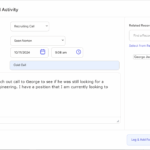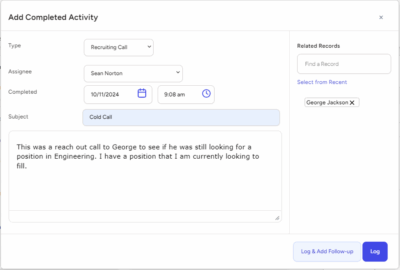Freelance and gig recruiting software is a type of platform designed to help employers and recruiters find and hire freelance or gig workers. With the rise of the gig economy and the growing number of professionals who prefer flexible work arrangements, there has been a significant increase in the demand for this type of software. In this article, we will explore the benefits of freelance and gig recruiting software, its key features, and some of the most popular platforms available in the market.
Benefits of Freelance and Gig Recruiting Software
There are many benefits to using freelance and gig recruiting software. Here are some of the most important:
Cost-effective: Freelance and gig recruiting software can save recruiters and employers a significant amount of money in the hiring process. They eliminate the need for expensive job postings, and the time and cost associated with sorting through resumes and applications.
Time-saving: This software can also save recruiters and employers a lot of time. They provide tools for posting jobs, filtering candidates, and conducting interviews, all in one place. This can streamline the hiring process and help companies find qualified candidates faster.
Access to a larger pool of candidates: Freelance and gig recruiting software can provide access to a wider pool of candidates, including those who are not actively looking for work. These platforms can also help recruiters and employers find candidates with specific skills or experience.
Improved communication: Freelance and gig recruiting software can improve communication between recruiters, employers, and candidates. Many platforms provide messaging or chat features that allow recruiters and candidates to communicate directly.
Key Features of This Recruiting Software
Freelance and gig recruiting software comes with a wide range of features that are designed to make the hiring process easier and more efficient. Here are some of the most common features:
Job posting: This recruiting software platforms allow recruiters and employers to post job listings. These job postings typically include information about the job, such as the title, description, requirements, and pay.
Candidate screening: Freelance and gig recruiting software often includes tools for screening candidates. These tools can include filters based on specific criteria, such as location, experience, and skill level.
Communication tools: Many platforms provide communication tools that allow recruiters, employers, and candidates to communicate directly. These tools can include messaging, chat, or email features.
Interview scheduling: Some freelance and gig recruiting software platforms provide tools for scheduling interviews with candidates. These tools can help recruiters and employers save time and avoid scheduling conflicts.
Performance tracking: Some platforms provide tools for tracking the performance of freelancers or gig workers. These tools can help employers and recruiters evaluate the quality of work and make informed hiring decisions in the future.
Freelance and Gig Recruiting Software Best Practices
Freelance and gig recruiting software can be a powerful tool for finding and hiring top talent for your business. However, to make the most of this software, there are certain best practices that you should follow. Below are some of the most important best practices for using this recruiting software to recruit and hire top talent.
Be clear about your needs: The first step in using this software is to be clear about your needs. This means defining the job you need to fill, the skills and experience required, and the pay rate. The more specific you are about your needs, the easier it will be to find the right candidate.
Use multiple platforms: There are many freelance and gig recruiting software platforms available in the market. To find the best talent, it is important to use multiple platforms. This will give you access to a wider pool of candidates and increase your chances of finding the right fit for your needs.
Use filters: Most freelance and gig recruiting software platforms provide filters that allow you to narrow down your search based on specific criteria, such as location, experience, and skill level. Use these filters to ensure that you are only considering candidates who meet your requirements.
Review portfolios and samples: When considering candidates, it is important to review their portfolios and samples of their work. This will give you a better idea of their skills and experience and help you determine if they are a good fit for your needs.
Use test projects: Before hiring a freelancer or gig worker, consider using a test project to evaluate their skills and work style. This will help you determine if they are a good fit for your needs and avoid wasting time and money on a project that does not meet your requirements.
Be clear about expectations: When hiring a freelancer or gig worker, it is important to be clear about your expectations. This includes the scope of the project, the timeline, and the pay rate. Being clear about your expectations will help ensure that the project is completed to your satisfaction.
Use communication tools: Most freelance and gig recruiting software platforms provide communication tools that allow you to communicate directly with candidates. Use these tools to stay in touch with candidates throughout the hiring process and to ensure that everyone is on the same page.
Provide feedback: When working with freelancers or gig workers, it is important to provide feedback on their work. This will help them improve their skills and ensure that the project meets your expectations. Providing feedback can also help build a positive working relationship with the freelancer or gig worker.
Manage projects effectively: When working with freelancers or gig workers, it is important to manage projects effectively. This includes setting clear expectations, providing feedback, and ensuring that the project is completed on time and within budget. Using project management tools can help you stay organized and ensure that the project is a success.
Pay fairly and on time: Finally, it is important to pay freelancers and gig workers fairly and on time. This will help build a positive working relationship and ensure that you have access to top talent in the future. Delayed or unfair payment can damage your reputation and make it difficult to attract top talent.
Freelance and gig recruiting software can be a powerful tool for finding and hiring top talent for your business. By following these best practices, you can ensure that you are making the most of this software and finding the right candidates for your needs.








